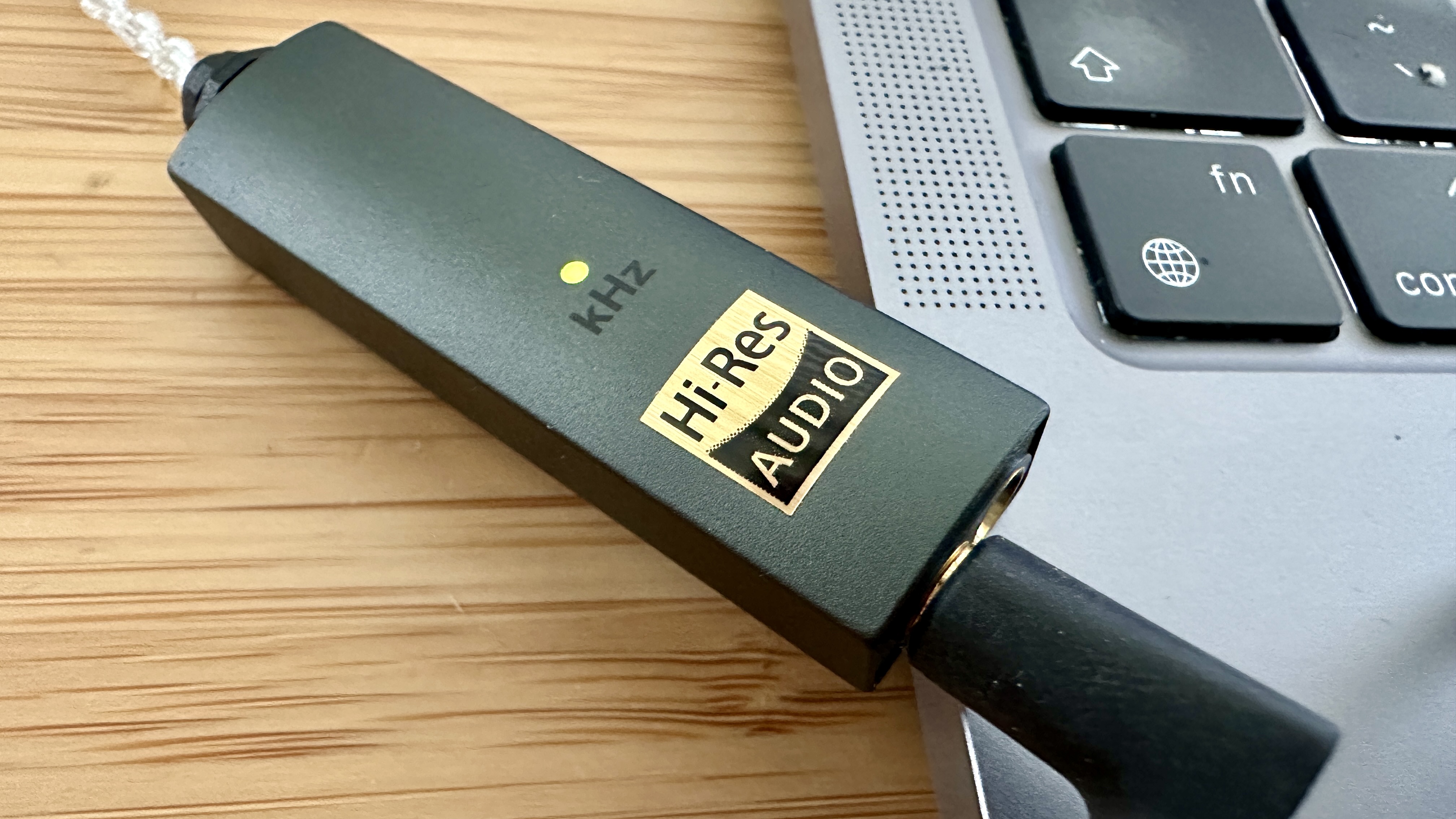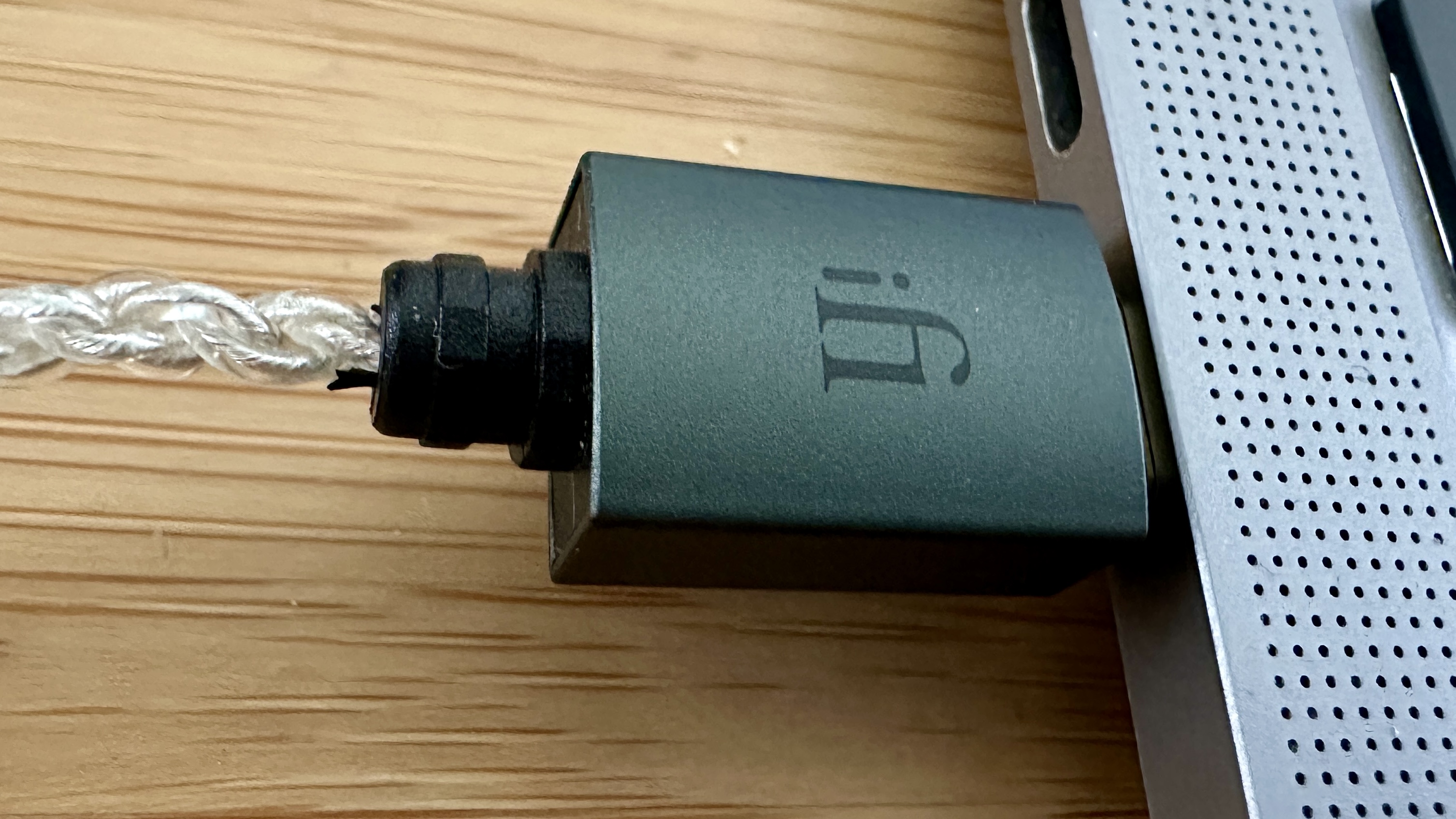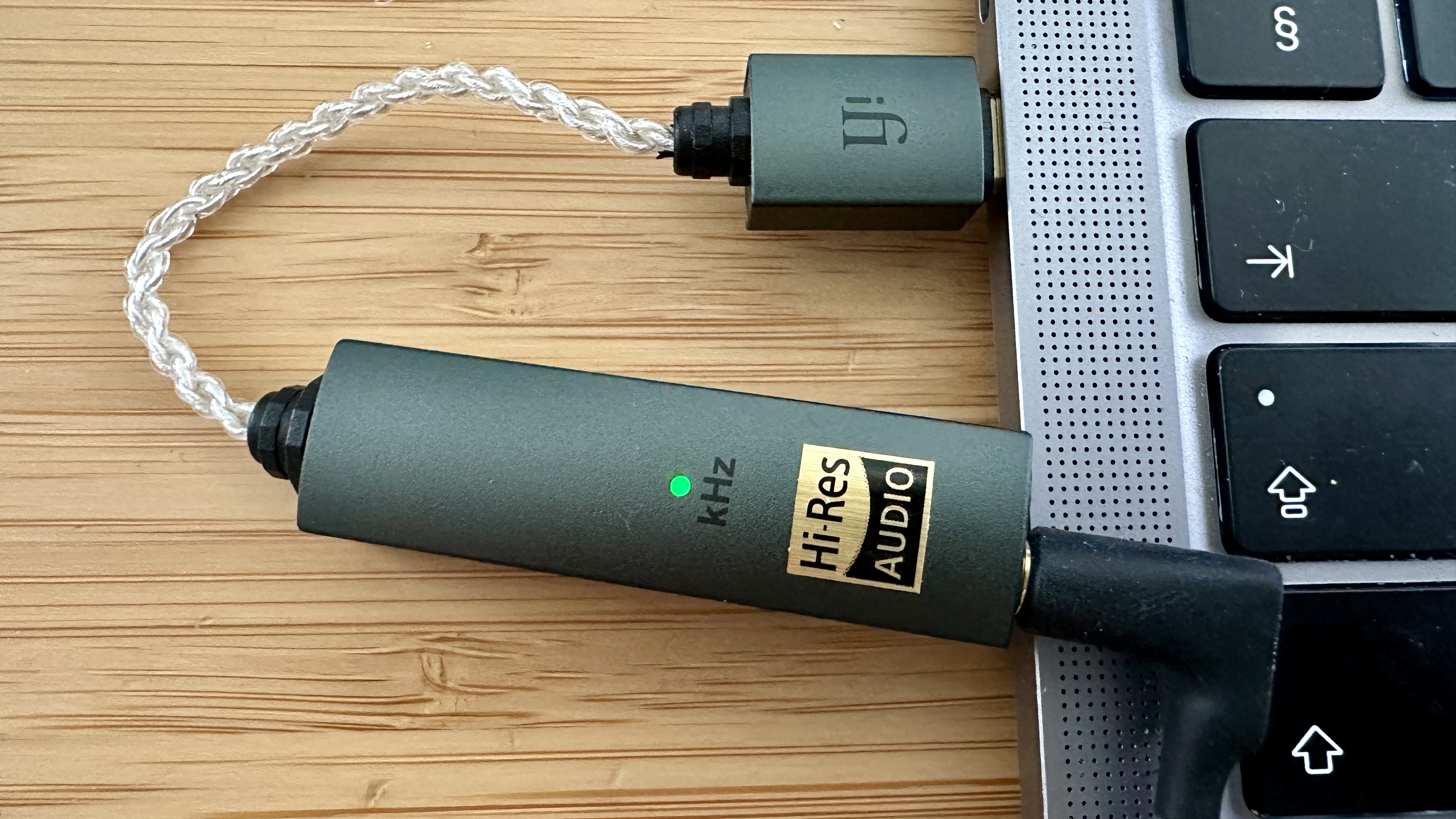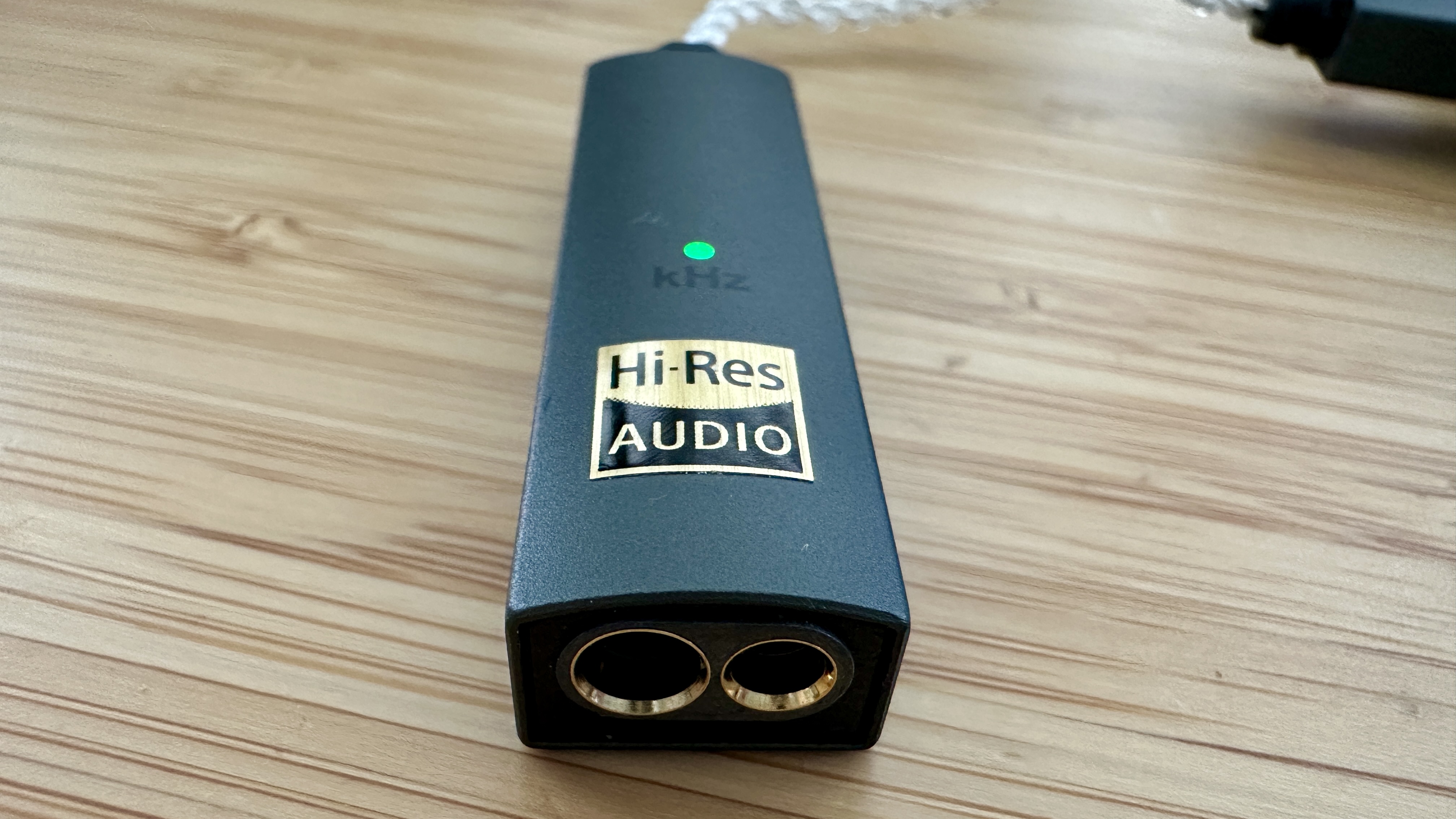iFi GO Link Max review: a USB-C DAC that's one of the best ways to get affordable hi-res audio from your smartphone we've ever found
iFi GO Link Max: Two-minute review
iFi has taken the proven GO Link formula and, by adding a balanced 4.4mm headphone output and deleting MQA compatibility (which is, let’s not pretend otherwise, no loss), produced the GO Link Max.
It’s a little larger than its more affordable sibling – but that’s not the same as being large. And its relative bulk is mitigated no end by classy metal casework. Only the exposed braided cable that connects the main body of the DAC to the block which plugs into your source device, gives us any cause for concern. And even then, its vulnerability is theoretical rather than actual.
Like virtually every iFi product TechRadar has tested, the GO Link Max performs well and offers significant value for money. No matter if it’s connected to a smartphone or a laptop, with a half-decent pair of headphones at the other end this DAC is capable of putting a rocket up the sound quality you’d otherwise be treated to. In every meaningful respect, it improves on the unassisted sound of your computer or phone – and not in a subtle way. Is it one of the best portable DACs available for this money? You probably know the answer to that…
iFi GO Link Max review: Price and release date

- Released November 20, 2024
- Priced $79 / £79 / AU$139
The November 2024-release iFi GO Link Max USB DAC is on sale now, and in the United Kingdom it costs no more than £79. In the United States it will set you back $79, while in Australia it sells for $139.
The world’s far from short of affordable USB DACs, of course (not least from iFi itself – see the admittedly pricier $499 / £449 / AU$769 iFi GO Bar Kensei or the five-star iFi hip-dac 3 at $199 / £199 / AU$349 for starters). But nevertheless, the combination of price and specification looks alluring here…
iFi GO Link Max review: Features

- DSD256 and 32bit/384kHz PCM support
- Twin ESS Sabre ES9219 DACs
- Unbalanced 3.5mm and balanced 4.4mm outputs
Of course, the iFi GO Link Max is something of a one-trick pony – and so consequently it has very few features. Those features it has, though, are designed to get that one job done in some style.
So at one end of the braided cable there’s a little block with a USB-C connector on the end. iFi provides both lightning and USB-A adapters to fit it, so the GO Link Max should be compatible with any smartphone or laptop you care to mention. At the other end of the cable there’s a larger block with unbalanced 3.5mm and balanced 4.4mm outputs at its end, and on the inside is everything required to turn digital audio information into analogue as effectively as possible.
iFi has deployed twin ESS Sabre ES9219 DAC chipsets to get the job done – which means the GO Link Max can deal with audio files up to DSD256 and PCM 32bit/384kHz resolution. And fittingly for a company that’s never been afraid of a good acronym or two, iFi has fitted this little device with ‘THDC’ (total harmonic distortion compensation) technology to keep harmonic distortion to a minimum, and ‘DRE’ (dynamic range enhancement, sadly, and nothing to do with the celebrated hip-hop producer) which – hey! – wants to increase the dynamic contrast between the quietest and the loudest moments in your music.
This arrangement, says iFi, results in a USB DAC that can twist out 100mW of power from the unbalanced output and over 240mW from the balanced alternative. Which is a lot by any USB DAC standards, and should allow the GO Link Max to drive pretty much any appropriate headphones without problems.
Features score: 5 / 5
iFi GO Link Max review: Sound quality

- Greater dynamism and improved levels of detail
- More positive, punchier sound
- Across-the-board improvements
Let’s face it: only the most optimistic customers buy a new laptop or smartphone expecting sonic excellence. These devices are too noisy (in electrical terms) and too feature-heavy for audio quality to be anything other than an afterthought. If you want great sound while you’re out and about or at your desk, a dedicated music player might seem to be the way forward. iFi, though, disagrees – and the way this GO Link Max can make your laptop or smartphone sound demonstrates that as long as the critical stuff is done properly, these can be just as viable a source of music as the most expensive stand-along digital audio player.
The difference in quality between plugging a pair of headphones directly into the headphone socket of an Apple MacBook Pro, say, and plugging the same headphones into the GO Link Max having connected it via its USB-C is really remarkable. The gains are far from mild, and they are wide-ranging. In all honesty, the reproduction is of an entirely different standard.
Take mid-range resolution, for instance. A 16bit/44.1kHz file of Lisa O’Neill’s Old Note is more detailed, more direct, carries greater harmonic variation and is, in the final analysis, simply more communicative and eloquent when heard via the iFi USB DAC. Daft Punk’s Get Lucky as a 24bit/48kHz FLAC file demonstrates greater low-frequency depth and texture, increased dynamic headroom, and an altogether more assured way with rhythm and tempo management. And Lobbo by Vieux Farka Touré et Khruangbin as a 24bit/96kHz file has greater bite and presence at the top of the frequency range, as well as increased substance.
The frequency range hangs together more smoothly and confidently, and the tonal balance is improved too. Soundstaging is more open, better defined and far more effectively controlled than it is when you leave the computer to deal with things. There’s just no aspect of music reproduction that the iFi GO Link Pro doesn’t deal with far more effectively than an expensive, high-end laptop computer.
Sound quality: 5 / 5
iFi GO Link Max review: Design

- Braided connecting cable
- 150 x 15 x 10mm (HxWxD)
- 14.5g
Just as with the ‘features’ section, the GO Link DAC is a functional, no-frills device where ‘design’ is concerned. This is a product that needs to be as small, light and portable as is realistically possible, and that’s exactly what iFi has delivered.
The metal casework of the two sections of the DAC feel and look good, and give a hint of the premium to what’s a necessarily discreet device. There’s a single LED on the main body of the GO Link Max, which lights up in one of a selection of colours to indicate the size of the digital audio file it’s dealing with – though I can’t help thinking it’s a bit of a shame that the same colour (green) indicates PCM all the way up to 96kHz. A little visual confirmation that 96kHz is a significantly higher resolution than 44.1kHz might be nice…
The only aspect of the design that’s in any way problematic is the braided cable that joins the two sections of the DAC, and even then, this is a theoretical issue rather than anything tangible. iFi reckons the braiding helps shield the cable from outside interference, and I’ve no reason to think that’s not the case – it just feels a bit vulnerable for a product that’s likely to spend a lot of its life in a pocket or a bag.
Design score: 4.5 / 5
iFi GO Link Max Review: Usability and setup
- Plug into your smartphone or laptop
- Plug in your headphones
- Away you go!
“It’s not rocket science” is, I think, too weak a description for how straightforward the iFi GO Link Max is to use. Plugging the USB-C end into your laptop or smartphone at one end, and your headphones in at the other, doesn’t require in-depth instructions - and if you can’t get this device up and running in mere seconds, I don’t think any amount of instructions are likely to help.
Usability and setup score: 5 / 5
iFi GO Link Max review: Value
- You simply can't argue with the value for money here
- Does what it does in fine style
The iFi GO Link Max represents unarguable value for money. The latent fragility of the cable aside, it’s robustly made, properly finished, light and portable – and it does what it does in fine style. If you want to maximise your portable and/or desktop audio experience without spending an arm and a leg, you really can’t go wrong here.
Value score: 5 / 5
Should I buy the iFi GO Link Max?
Buy it if...
You take portable or desktop listening seriously
Getting the best audio quality possible out of your laptop or smartphone really couldn’t be any easier
You own some half-decent wired headphones
A balanced output is particularly welcome, and it makes plain just how serious a device the GO Link Max is
You have access to genuinely hi-res digital audio content
The ability to deal with 32bit/384kHz and DSD256 files is most certainly not to be sniffed at
Don't buy it if...
You’re ham-fisted
It’s not as if the cable connecting the two pieces of my GO Link DAC has failed - it just feels like it might
iFi GO Link Max review: Also consider
If you can live without the 4.4mmm balanced output, the even smaller, even lighter iFi GO Link USB DAC makes a whole lot of sense – especially as it’s usefully cheaper than the already-quite-affordable GO Link Max. If you want to free yourself for the ubiquity of iFi, though, it’s worth considering FiiO’s KA13 – by iFi standards its relatively bulky, but it get the job done in fine style.
How I tested the iFi GO Link Max
- Qobuz and Tidal; Android smartphone and Apple MacBook with Colibri software
- Sennheiser IEMs; Austrian Audio over-ears
I plugged the iFi GO Link Max into a Samsung Galaxy S21 smartphone using the USB-C connection, and into an Apple MacBook Pro using the same socket. I also connected it to an Apple iPhone 14 Pro via the Lightning adapter. Each device is loaded with Qobuz and TIDAL music streaming service apps, and the laptop also features Colibri software to get around Apple’s inexplicable disdain for truly hi-res digital files. Headphones included Sennheiser IE900 (connected using the 4.4mm socket) and Austrian Audio Hi-X20 (using the 3.5mm equivalent), and music came from every era and every genre. I listened to the GO Link Max for well over a working week this way – and it was no kind of hardship.
- First reviewed: December 2024
- Read TechRadar's reviews guarantee
0 comments:
Post a Comment